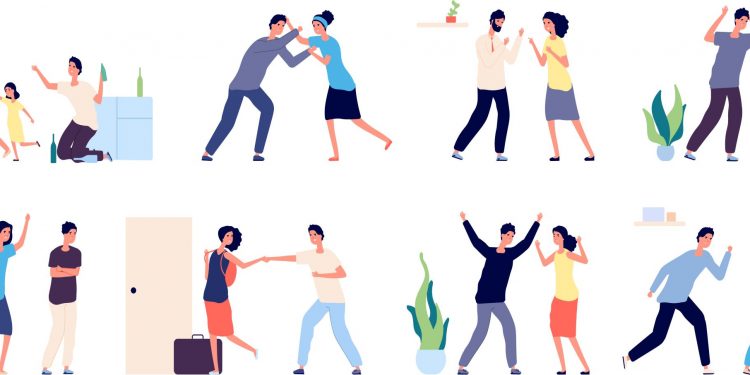Dr. Shane Steadman, DC, DACNB, DCBCN, CNS
As the world around us is stressful with a pandemic and stay-at-home orders, the incidence of domestic violence (DV) has increased. An article titled, “Alarming trends in US domestic violence during the COVID-19 pandemic,” notes an increase in DV during the pandemic and provides data on this topic. According to the CDC, one in four women and one in ten men experience intimate partner violence (IPV). There have been more conversations this year about those spending more time with their partner, working from home and with limited social interactions. Before the start of the pandemic, there was a few talking about this issue but over the last year it has become a topic of discussion in many small circles. With domestic violence being discussed and written about, the goal is to bring awareness, but also understanding of the impact it has on people’s health. Mental health is one of the major areas that articles and studies focus on but little is mentioned about the neurological and physiological changes that occur.
Survivors of IPV can have brain injuries as a result of one or multiple blows to the head, a head pushed into objects, a person pushed downstairs or severely shaken. Survivors can also suffer oxygen deprivation due to strangulation. Brain injuries and decreased levels of oxygen can have profound effects at the time and for the rest of their lives. Along with head injuries, the physiological changes due to cortisol elevation can affect the physiology of other systems in the body. Over the years, I have worked with patients who have concussions/TBIs related to DV. These patient present similar to athletes who suffer a head injury, with additional signs and symptoms of PTSD. In addition to the injuries sustained, many of these patients are also on disability and/or unable to acquire or maintain employment.
Neurologically, people who suffer brain injuries can have signs and symptoms of sensitivity to light and sound, decreased short-term memory, insomnia, anxiety, decreased cognitive function, decreased executive function, alterations in mood, and potential changes in personality. Changes in brain function can lead to changes in endocrine, immune, and the gastrointestinal system. Many patients will discuss changes in sleep, digestion (i.e., heartburn, constipation, bloating), hormones, and weight to name a few. Brain injuries also cause neuroinflammation or microglial activation. Microglia are cells in the nervous system that mediate the immune system, clear debris, and maintain health in the central nervous system. If this system is repeatedly activated, the cells become primed, making it easier to activate with trivial injuries or inflammation. Most common complaints with neuroinflammation is brain fog or “walking through mud.” Decreased oxygen levels in the brain can lead to symptoms such as fatigue, migraines, shortness of breath, insomnia, anxiety, and confusion. Microglia are activated with this process and can lead to neuroinflammation similar to what is experienced with brain injuries.
Immune and physiological changes are seen due to IPV. First, cortisol is a hormone that is produced because of stress, inflammation and during acute reactions.
Cortisol has influence on many processes within the body. Neurologically, cortisol impacts many areas of the brain, with one of the biggest being the hippocampus. The hippocampus is densely populated with receptors for cortisol and can lead to altered function. Hippocampal dysfunction in the brain can lead to a decrease in learning and memory, alteration in the circadian rhythm, as well as interactions with the amygdala (emotions). Metabolically, cortisol inhibits and alters function of digestion, hormones, and the immune system. A DV patient will complain of gas and bloating, indigestion, heartburn, food sensitivities, and constipation. Cortisol can also have a negative impact on hormone regulation. This is seen with alterations in menstrual cycles, abnormal hormone levels, and thyroid function. When changes in gastrointestinal and endocrine function are noted, other metabolic and immune changes are seen as the body compensates to maintain survival in a fight-or-flight response.
As a survivor or a caregiver, it is important to not only look at the mental health aspect of recovery but the brain and metabolic system. Finding a qualified practitioner that specializes in concussion/TBI rehabilitation is essential in the healing process. The brain is an intricate system that regulates emotions, executive function, cognitive, and metabolic processes. The healing process should also include a practitioner that is well versed in functional medicine. Such practitioners are trained to look at the whole person and evaluate the interactions of metabolic systems. Even though the person suffered a brain injury, addressing the compensation and imbalances is vital when looking toward long-term recovery. Traditional medicine and mental health providers are an essential aspect of recovery, but often, holistic care is not discussed or is underestimated. In our office, all areas are addressed and considered when developing a treatment plan. There is a time and place for each and navigating this alone can be difficult. There are practitioners who can be an advocate and offer care while on this journey.
The hope is that more people, organizations and medical professionals are recognizing IPV and how underserved this community is. The pandemic has brought this closer to the top of mind for many. More education, screening, and awareness is needed for everyone to better understand how to recognize victims of IPV, especially law enforcement officers and medical providers, but also family, friends, co-workers, and neighbors. Strategies for mental health are not the only area for care but understanding the integration of the brain and body is important in the healing and rehab process for the victims of intimate partner violence.
Dr. Shane Steadman, DC, DACNB, DCBCN, CNS, is the owner and clinic director of Integrated Brain Centers. To learn more about how they can help with concussions, stroke, and TBIs, please visitwww.integratedbraincenters.com. For a free consultation, please call 303-781-5617.











